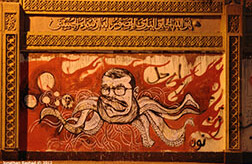Recent Articles

APR 23, 2013 • Article
Exit, Voice, and Loyalty at the Khmer Rouge Tribunal: Should the International Community Stay or Go?
The Khmer Rouge Tribunal is in big trouble, much of it financial. But the financial deficit is the result of something deeper: a responsibility deficit. ...
APR 15, 2013 • Journal Online Exclusive
The Resource Curse and the Separation of Powers
The resource curse is a complex problem that affects a great many. It has rightly occupied an important place in debates about global justice. Creating ...

APR 11, 2013 • Article
Years Later, Secular Student Group Recognized On A Religious Campus: Here's How It Happened
In order to be truly inclusive, interfaith dialogue and collaboration must also include those without faith.

APR 11, 2013 • Article
Book Review: "The Undivided Past: Humanity Beyond Our Differences"
"The Undivided Past" aims to show that "the most resonant forms of human solidarity," as author David Cannadine elegantly puts it, are unstable and often ...

APR 9, 2013 • Article
Why Dictators Don't Like Jokes
Pro-democracy activists around the world are discovering that humor is one of the most powerful weapons in the fight against authoritarianism.

APR 9, 2013 • Article
Policy Innovations Digital Magazine (2006-2016): Commentary: Social Covenants Must Precede Social Contracts
Fragile states that do not first forge a social covenant will later find it difficult to codify justice in a social contract.

APR 3, 2013 • Article
Ethics on Film: Discussion of "Argo"
"Argo," which tells the story of a creative and daring escape from revolution-era Iran, won the Oscar for Best Picture and was a resounding commercial ...
APR 1, 2013 • Journal
Spring 2013 (27.1)
This issue features an essay by Shefa Siegel on the missing ethics of mining; a Carnegie Council Centennial special section on "Just War and Its ...

MAR 26, 2013 • Article
Policy Innovations Digital Magazine (2006-2016): Innovations: Sustainable, Happy, Efficient: A Complete Indicator of Well-being
Only through a composite metric of progress and happiness can governments measure and deliver what matters most: sustainable well-being.

MAR 22, 2013 • Article
Policy Innovations Digital Magazine (2006-2016): Commentary: Will Global Voluntarism Supersede Rule of Law?
The World Economic Forum is advocating a move toward coalitions of the willing and able for solving global problems. Will it work?